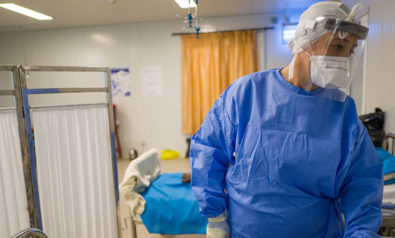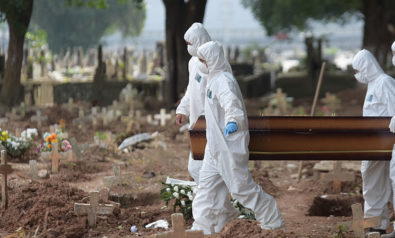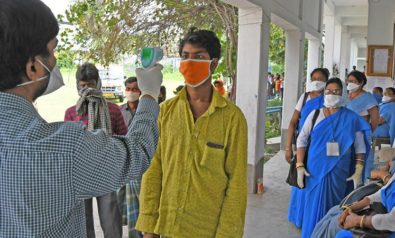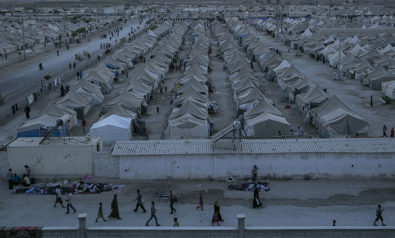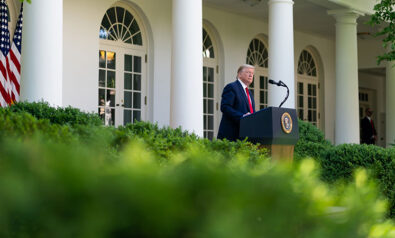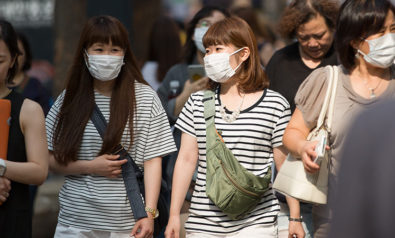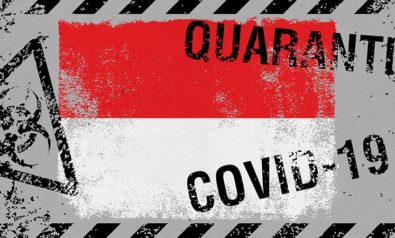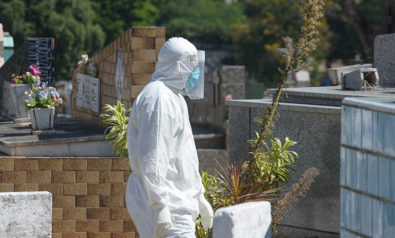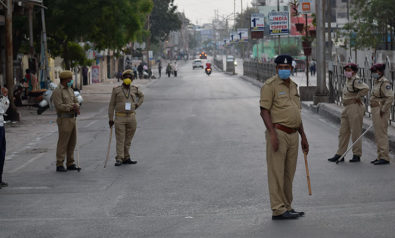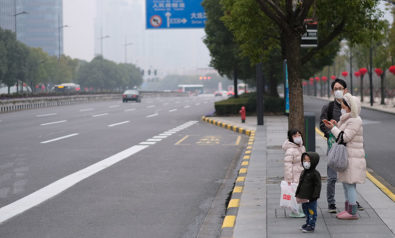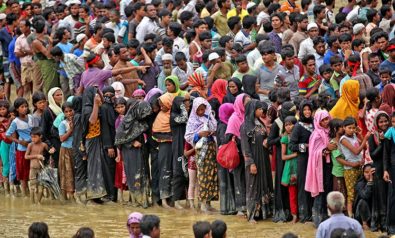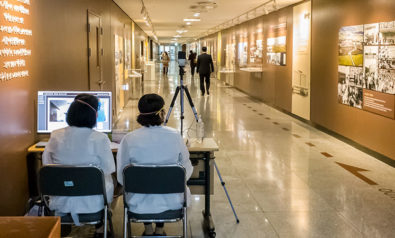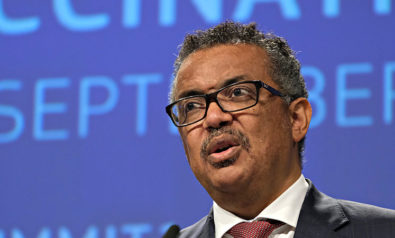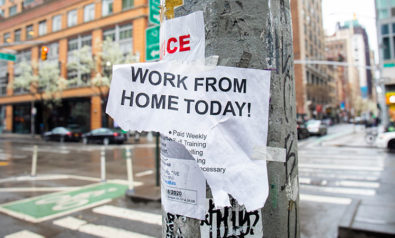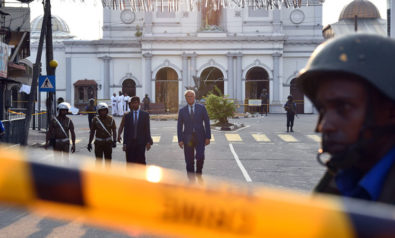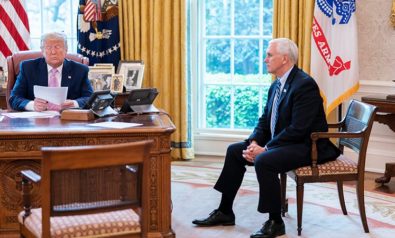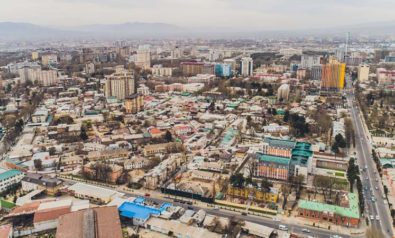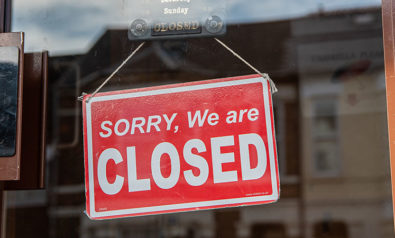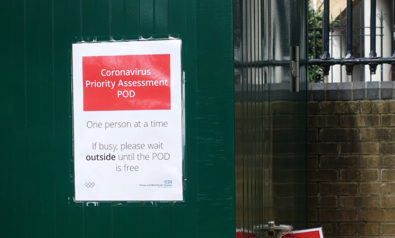As the novel coronavirus known as COVID-19 sweeps across the globe, countries are shutting down. Yet Brazil’s ultra-right president, Jair Bolsonaro, has emerged among world leaders as a voice of opposition against lockdowns. Trying to weaken the initiatives of the ministry of health and local politicians who are encouraging social distancing measures as a way to slow the spread of the virus, Bolsonaro is urging Brazil’s population of 212 million to ignore the pandemic and carry on with business as usual.
Will the Coronavirus Crisis Bring Down Hungary’s Failing Democracy?
On March 24, after the health ministry confirmed 2,200 infections and 46 deaths in Brazil (these numbers have since multiplied), Bolsonaro held a televised address and said: “Our lives have to go on. Jobs must be kept … we must, yes, get back to normal.” In the speech, he blamed the media for spreading panic around a “fantasy” and a “trick” that he considers to be a “little flu or a bit of a cold,” in reference to COVID-19.
Just days later in an unprecedented move, Twitter, Facebook and Instagram erased several messages posted on Bolsonaro’s official accounts. His posts contained fictitious and misleading information about the coronavirus as he called on citizens to take to the streets to protest against a lockdown.
Predictions for Brazil
Bolsonaro’s anti-quarantine policy could put Brazilians at risk. His indifference to human suffering and the loss of lives is now more blatant than ever. Bolsonaro has made countless remarks throughout his political career defending torture and violent dictators, as well as encouraging murderous security policies against poor people and minorities in Brazil. But now in the face of this pandemic, his irresponsible ideas transcend mere rhetoric and now threaten millions of lives.
A study by the Centre for Global Infectious Disease Analysis at Imperial College London suggests that without preventative measures against the coronavirus, more than 1 million people could die in Brazil. These estimates also predict that if the country adopts early quarantine measures throughout, then its number of deaths from COVID-19 could range from 44,000 to 529,000, depending on how prompt and rigid the lockdown is.
Bolsonaro’s incompetency and inhumanity are leading to his isolation and growing unpopularity among voters. In a miscalculation, the president interpreted the pandemic as an opportunity to advance his narrow political interests in two ways.
First, the Brazilian economy is showing signs of a fast-approaching recession as projections indicate negative GDP growth of around 1% this year. Aware of the risk a recession poses to the popularity and longevity of his already fragile government, Bolsonaro wants to blame the upcoming economic troubles on authorities who have imposed local quarantines.
Second, with the inevitable spread of the coronavirus in Brazil, Bolsonaro will also attempt to shirk his national duties. He will transfer responsibility to local authorities as chaos overwhelms the underfunded and crippled public health system when the pandemic reaches its peak. Selfish political strategies should have no place in the fight against the deadly coronavirus, but Bolsonaro simply doesn’t know how to rise above his own egotistical frame of mind.
Brazil’s Weak Public Health System
Brazil’s preparedness to fight the pandemic is questionable. The number of beds in intensive care units (ICU) has decreased since 2009, and today the country has approximately 55,000 ICU beds. Yet only half of these are for public health use, and they are unevenly distributed across the country. According to Imperial College London, in the best-case scenario when adopting early quarantine measures, Brazil would need 57,000 ICU beds, but in the event of a last-minute lockdown being enforced, that figure would skyrocket to 460,000.
Brazil’s public health system is already under pressure as other diseases have hit the country hard in recent years. According to the World Health Organization, Brazil is among the world’s top 30 high-burden countries regarding tuberculosis, a bacterial infection that makes victims more susceptible to complications from COVID-19.
To make matters worse, from 2015 to 2019 tropical diseases, such as dengue, Zika and chikungunya, have infected approximately 1.7 million people. In the first two months of 2020, some regions in Brazil experienced a 128% increase in dengue cases compared to the same period in 2019.
Both the coronavirus and Jair Bolsonaro are pushing Brazil to the edge of a cliff. In his 1842 short story, “The Masque of the Red Death,” American writer Edgar Allan Poe wrote about Prince Prospero who ignores the existence of a deadly plague in his kingdom and organizes a masquerade ball in his castle for the noble class. During the party, he confronts a mysterious masked individual dressed in a red robe and asks the death-like figure, “Who dares insult us with this blasphemous mockery?” Prospero dies immediately.
Like the fate of Poe’s prince, Bolsonaro will find his own political demise inescapable if he belatedly attempts to tackle COVID-19. Brazilians are fighting not only a virus, but also the leadership style of a president who ignores his duty to confront a public health crisis. The only good news in all of this is how the coronavirus is waking Brazilians up to the undeniable political reality that Bolsonaro deserves to be impeached.
The views expressed in this article are the author’s own and do not necessarily reflect Fair Observer’s editorial policy.
Support Fair Observer
We rely on your support for our independence, diversity and quality.
For more than 10 years, Fair Observer has been free, fair and independent. No billionaire owns us, no advertisers control us. We are a reader-supported nonprofit. Unlike many other publications, we keep our content free for readers regardless of where they live or whether they can afford to pay. We have no paywalls and no ads.
In the post-truth era of fake news, echo chambers and filter bubbles, we publish a plurality of perspectives from around the world. Anyone can publish with us, but everyone goes through a rigorous editorial process. So, you get fact-checked, well-reasoned content instead of noise.
We publish 2,500+ voices from 90+ countries. We also conduct education and training programs
on subjects ranging from digital media and journalism to writing and critical thinking. This
doesn’t come cheap. Servers, editors, trainers and web developers cost
money.
Please consider supporting us on a regular basis as a recurring donor or a
sustaining member.
Will you support FO’s journalism?
We rely on your support for our independence, diversity and quality.



